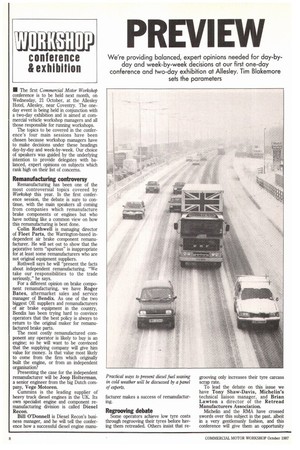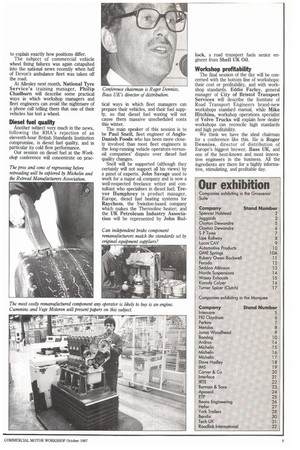• The first Commercial Motor Workshop conference is to be
Page 102

Page 103

If you've noticed an error in this article please click here to report it so we can fix it.
held next month, on Wednesday, 21 October, at the Allesley Hotel, Allesley, near Coventry. The oneday event is being held in conjunction with a two-day exhibition and is aimed at commercial vehicle workshop managers and all those responsible for running workshops.
The topics to be covered in the conference's four main sessions have been chosen because workshop managers have to make decisions under these headings day-by-day and week-by-week. Our choice of speakers was guided by the underlying intention to provide delegates with balanced, expert opinions on subjects which rank high on their list of concerns.
Remanufacturing controversy
Remanufacturing has been one of the most controversial topics covered by Workshop this year. In the first conference session, the debate is sure to continue, with the main speakers all coming from companies which remanufacture brake components or engines but who have nothing like a common view on how this remanufacturing is best done.
Colin Rothwell is managing director of Fleet Parts, the Warrington-based independent air brake component remanufacturer. He will set out to show that the pejorative term "spurious" is inappropriate for at least some remanufacturers who are not original equipment suppliers.
Rothwell says he will "present the facts about independent remanufacturing. "We take our responsibilities to the trade seriously," he says.
For a different opinion on brake component remanufacturing, we have Roger Bates, aftermarket sales and service manager of Bendix. As one of the two biggest OE suppliers and remanufacturers of air brake equipment in the country, Bendix has been trying hard to convince operators that the best policy is always to return to the original maker for remanufactured brake parts.
The most costly remanufactured component any operator is likely to buy is an engine; so he will want to be convinced that the supplying company will give him value for money. Is that value most likely to come from the firm which originally built the engine, or from an independent organisation?
Presenting the case for the independent remanufacturer will be Joop Holterrnan, a senior engineer from the big Dutch company, Vege Motoren.
Cummins is the leading supplier of heavy truck diesel engines in the UK. Its own specialist engine and component remanufacturing division is called Diesel Recon.
Bill O'Donnell is Diesel Recon's business manager, and he will tell the conference how a successful diesel engine manu facturer makes a success of rernanufacturmg.
Removing debate
Some operators achieve low tyre costs through regrooving their tyres before having them retreaded. Others insist that re grooving only increases their tyre carcass scrap rate.
To lead the debate on this issue we have Tony Shaw-Davis, Michelin's technical liaison manager, and Brian Lawton a director of the Retread Manufacturers Association.
Michelin and the RMA have crossed swords over this subject in the past. albeit in a very gentlemanly fashion, and this conference will give them an opportunity to explain exactly how positions differ.
The subject of commercial vehicle wheel fixing failures was again catapulted into the national news recently when half of Devon's ambulance fleet was taken off the road.
At Allesley next month, National Tyre Service's training manager, Philip Chadburn will describe some practical ways in which workshop managers and fleet engineers can avoid the nightmare of a phone call telling them that one of their vehicles has lost a wheel.
Diesel fuel quality
Another subject very much in the news, following the RHA's rejection of an eleventh-hour British Standards Institution compromise, is diesel fuel quality, and in particular its cold flow performance.
Our session on diesel fuel at the Workshop conference will concentrate on prac The pros and cons of regrooving before retreading will be explored by Michelin and the Retread Manufacturers Association. tical ways in which fleet managers can prepare their vehicles, and their fuel supply, so that diesel fuel waxing will not cause them massive unscheduled costs this winter.
The main speaker of this session is to be Paul Snell, fleet engineer of AngloDanish Foods who has been more closely involved than most fleet engineers in the long-running vehicle operators-versusoil companies' dispute over diesel fuel quality changes.
Snell will be supported (although they certainly will not support all his views) by a panel of experts. John Savage used to work for a major oil company and is now a well-respected freelance writer and consultant who specialises in diesel fuel; Trevor Humphrey is product manager, Europe, diesel fuel heating systems for Raychem, the Swindon-based company which makes the Thermoline heater; and the UK Petroleum Industry Association will be represented by John Bul lock, a road transport fuels senior engineer from Shell UK Oil.
Workshop profitability The final session of the day will be concerned with the bottom line of workshops: their cost or profitability, and with workshop standards. Eddie Farley, general manager of City of Bristol Transport Services will describe the Institute of Road Transport Engineers brand-new workshops standard manual, while Mike Hitchins, workshop operations specialist of Volvo Trucks will explain how dealer workshops can reconcile high standards and high profitability.
We think we have the ideal chairman for a conference like this. He is Roger Denniss, director of distribution of Europe's biggest brewer, Bass UK, and one of the best-known and most innovative engineers in the business. All the ingredients are there for a highly informative, stimulating, and profitable day.




































































































































